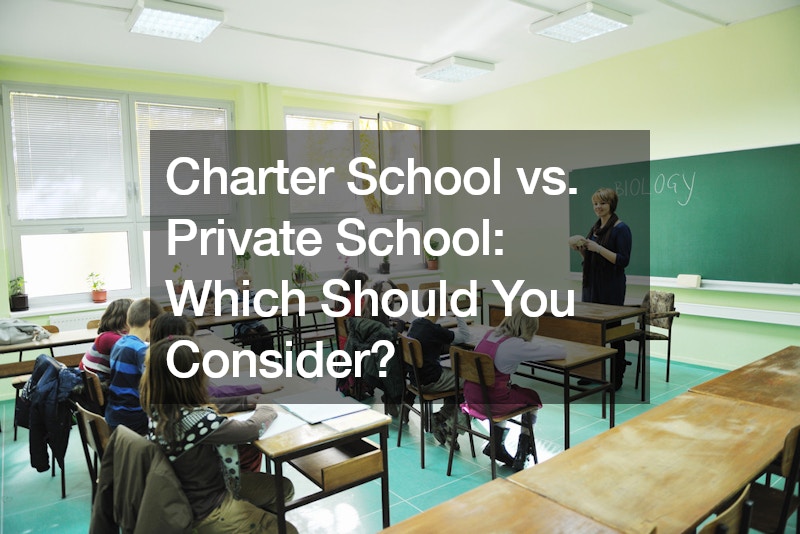Choosing the right school for your child is one of the most important decisions a parent can make. If you’re exploring alternatives to traditional public education, you’ve likely come across charter schools and private schools. But how do you decide between the two? Let’s break down the key differences to help you make an informed choice.
Funding
One significant difference between charter schools and private schools lies in their funding sources. Private schools primarily rely on tuition fees paid by parents, while charter schools are funded by tax dollars and operate as public schools. However, some private schools may offer scholarships or financial aid to assist families with tuition costs.
Classroom Size
Another important consideration is classroom size. Private schools typically boast smaller class sizes compared to charter schools and traditional public schools. This smaller student-teacher ratio often allows for more individualized attention and tailored instruction. In contrast, charter schools may have larger class sizes but still strive to provide a more personalized learning experience compared to public schools.
Academics
Academic standards vary between private and charter schools. Private schools are known for their rigorous academic programs, often tailored to specific missions or educational philosophies. These schools may offer a wide range of academic opportunities and extracurricular activities. On the other hand, charter schools follow state guidelines for curriculum but may have more flexibility in teaching methods and approaches compared to traditional public schools.
Teacher Requirements
Teacher qualifications differ between private and charter schools. While public schools typically require teachers to hold state certifications, private schools have more flexibility in setting their own standards. Private schools may hire teachers based on qualifications such as advanced degrees or specialized training, while charter schools may have varying requirements depending on state regulations.
Cost Considerations
Cost is a significant factor to consider when choosing between charter and private schools. Private schools often come with hefty tuition fees, although some offer financial aid options. On the other hand, charter schools are tuition-free and funded by taxpayer dollars. However, families may still incur additional costs for uniforms, textbooks, and extracurricular activities.
Special Education Services
For students with special needs, the availability of support services is crucial. Charter schools and private schools approach special education differently. Charter schools typically offer special education services but may have varying levels of resources and expertise depending on the school’s focus and mission. Some charter schools specialize in serving students with specific learning needs, while others may have limited resources for special education. Private schools also provide special education services, but the extent and quality of these services can vary widely. Some private schools offer robust support programs with specialized staff and resources, while others may have more limited accommodations. Parents considering either option should research the school’s approach to special education and ensure it aligns with their child’s needs.
Parental Involvement
Parental involvement is often encouraged and valued in both charter and private schools. Charter schools may require parents to sign a commitment to be actively engaged in their child’s education, which can include attending meetings, volunteering in the classroom, or participating in school events. Similarly, private schools often have parent-teacher associations (PTAs) or other avenues for parental involvement, such as fundraising committees or advisory boards. These opportunities allow parents to have a voice in school decisions and contribute to the overall school community. However, the level of parental involvement required or encouraged can vary from school to school, so parents should consider their own availability and preferences when choosing a school.
College and Career Preparation
College and career readiness programs are vital for preparing students for success beyond high school. Charter schools and private schools may offer various resources and support services to help students navigate the college admissions process, explore career options, and develop essential skills for success. Charter schools often focus on college preparation, offering rigorous academic programs, SAT/ACT preparation courses, and college counseling services. Private schools similarly prioritize college readiness, with many providing individualized guidance counseling, college admissions workshops, and opportunities for internships or job shadowing. When choosing between charter and private schools, parents should consider the school’s track record of college acceptances, the availability of career-related programs, and the level of support provided to students as they plan for their futures. By selecting a school with robust college and career preparation resources, parents can help set their child up for long-term success.
Conclusion
Ultimately, the decision between a charter school and a private school depends on your family’s priorities and educational goals. Consider factors such as funding, classroom size, academic offerings, teacher qualifications, and cost when making your decision. Visiting schools, meeting with administrators, and talking to current students and parents can also provide valuable insights into each school’s culture and environment. By carefully weighing your options, you can find the best educational fit for your child.
Whether you opt for a charter school or a private school, ensuring a quality education for your child is paramount. By staying informed and involved in your child’s education, you can set them on the path to success.
.


